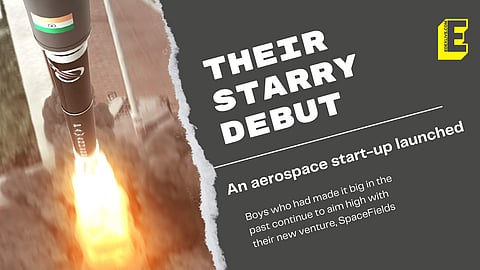

What started in 2016 as a group of like-minded engineering students exploring their passion has now taken the form of a start-up, incubated at the Society for Innovation and Development (SID), Indian Institute of Science (IISc) Bengaluru. The journey of these students, now graduates, is interesting and inspiration is a sure-shot by-product of their story. Co-founder and CEO of SpaceFields, Apurwa Masook, shares the idea behind founding the start-up and speaks about his team’s travails.
SpaceFields was launched in September 2021. The objective behind this start-up is to solve the problem of low availability of launch vehicles for small satellites. “The Indian Space Research Organisation (ISRO) is currently not able to do so,” says Apurwa. With already two rounds of fundraising under their belt, and with the help of grants supported by Startup India and Emergent Ventures, the start-up has now collected Rs 60 lakh. They will be building small-lift launch vehicles of payload capacity upto 1000 kg, catering to the needs of small satellites.
Apurwa says that “everything started at the young age of 17” when he got admission into Veer Surendra Sai University of Technology (VSSUT) in Burla, Sambalpur. When studying there, the student of Structural Engineering teamed up with Rounak Agarwal, a student of Computer Science, and Sudarshan Samal, who studied Mechanical Engineering, to build a satellite launch vehicle. The three teens had no pre-planned strategy to do so, but had merely come together as a group because they had shared a common passion — rocket science — and then had formulated the idea of a LV (launch vehicle). They wanted to achieve something that no one in India had achieved till then. But the building of the LV was not going to be a piece of cake.
The initial days were laced with hardships. What they had in mind was considered “far-fetched” by some faculty members, resulting in zero guidance and expertise. There was no workspace for them to experiment. They also faced a problem because of lack of funding and there were severe regulatory challenges, which included getting permissions from various government bodies to launch rockets. “There was also no provision for an aerospace and rocket science department at VSSUT,” he remembers. The students additionally had to juggle all these issues with their academics. However, Apurwa says that he and his team members “persisted on” and they successfully built the LV and named it VSLV (VSSUT Satellite Launch Vehicle).
The VSLV became highly popular and they subsequently launched seven sounding rockets, which won them a place in the Limca Book of Records in 2018. The Odisha government had showered them with laurels as they had been the first student body team in India to have achieved the feat. In January 2019, the Odisha boys were lauded by Prime Minister Narendra Modi in his Mann Ki Baat programme. The students also caught the attention of ISRO in 2020. ISRO then signed a MoU with VSSUT for the setting up of a Space Innovation Center in the VSSUT campus.
From a three-member team, they grew to a 50-member team by the end of their college years. SpaceFields, however, functions at present with a ten-member team, including the co-founders. Back in college, many sponsors and contributions from the Alumni association had helped them achieve their goal. Now, they are expecting to raise a round of private funding in the future to realise their dreams and fulfil the purpose of the start-up.
Apurwa has been very enthusiastic about his start-up throughout its journey. He says that since there is a lack of LVs for small satellites and problems are faced because of that, his start-up has a good scope for more innovations. He also said that ISRO has shown appreciation for their work, which might pave way for more enthusiastic young minds to venture into the field. And it all augurs well for the field of aerospace and rocket science in India.
